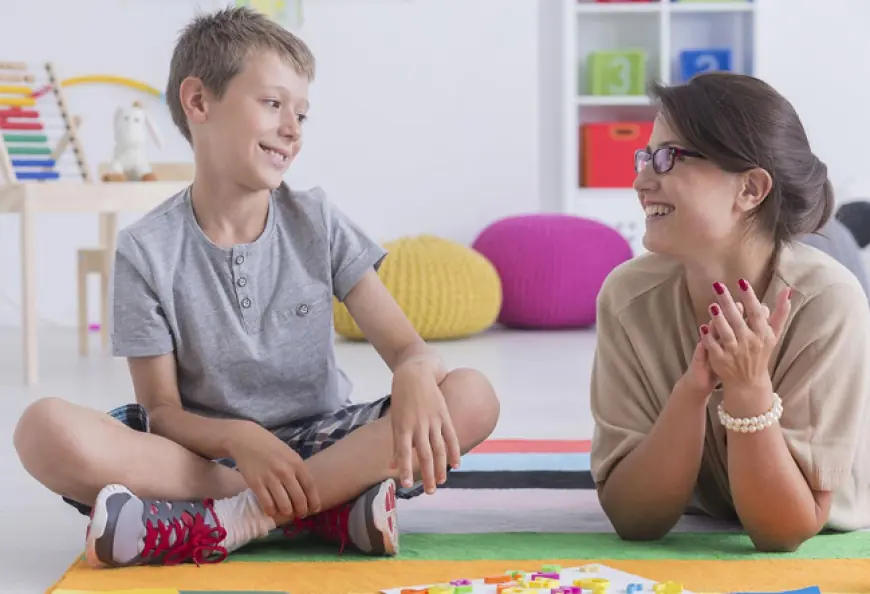What Are Effective Ways to Support a Child Struggling with Anxiety
Learn how to recognize anxiety in children and support them with calm routines, healthy coping skills, and professional child therapy when needed.

Anxiety in children is more common than most parents realize. From academic pressures and social fears to family changes and global events, kids today face a range of stressors that can feel overwhelming. Recognizing the signs early and offering proper support is key to helping them navigate these emotional challenges. One of the most impactful steps parents can take is seeking guidance from a child anxiety therapist, who specializes in helping young minds develop healthy coping mechanisms.
Recognize the Signs Early
Children don't always have the words to express their anxiety. Instead, it may show up through physical complaints like stomachaches, headaches, or frequent requests to stay home from school. Others may become withdrawn, irritable, or overly clingy. Identifying these signs early helps prevent anxiety from escalating into more serious emotional or behavioral issues. Keep an open line of communication and observe patterns in your child’s behavior and routines.
Create a Safe, Open Environment
Children need to know that their feelings are valid. Encourage open discussions by creating a home environment where they feel heard and safe to express themselves. Avoid dismissing their worries with statements like “Don’t be silly” or “There’s nothing to be afraid of.” Instead, say things like, “I see this is bothering you—let’s talk about it.” Validating their emotions builds trust and strengthens the parent-child bond.
Teach Calm Breathing Techniques
One of the simplest yet most effective tools for managing anxiety is teaching kids how to control their breathing. Slow, deep breaths can activate the body’s relaxation response and reduce immediate symptoms of anxiety. You can make it fun by using bubbles, pinwheels, or by practicing “smell the flower, blow out the candle” exercises to make breathing techniques relatable and engaging.
Stick to Routines
Consistency helps children feel secure. Keeping predictable routines—especially during the school week—can help reduce anxiety triggers. When they know what to expect next, their world feels more stable and less chaotic. Include regular sleep schedules, healthy meals, and downtime to unwind, which all support emotional well-being.
Limit Exposure to Stressors
Too much screen time, negative news, or overwhelming schedules can amplify anxiety. Monitor your child’s exposure to social media, news outlets, and adult conversations that may increase their stress. Offer age-appropriate explanations about any changes happening at home or in the world, focusing on reassurance and safety.
Encourage Problem-Solving Skills
Rather than immediately jumping in to fix your child’s problems, help them learn to come up with solutions on their own. Role-playing or talking through scenarios like “What would you do if you forgot your homework?” gives kids the confidence to handle situations independently. This empowerment can reduce anxiety by giving them a sense of control.
Model Healthy Emotional Responses
Children observe and mimic adult behaviors. If they see you reacting to stress with calm, constructive strategies, they’re more likely to adopt those same responses. Talk openly about your own feelings in an age-appropriate way. Saying things like, “I felt nervous before my presentation, so I practiced deep breathing” shows them that anxiety is normal and manageable.
Encourage Physical Activity
Movement is a natural stress reliever. Whether it’s riding a bike, dancing in the living room, or playing outside, physical activity releases feel-good chemicals that improve mood and reduce tension. Encourage at least 30 minutes of movement each day to help your child regulate both energy levels and emotions.
Foster Social Connections
Strong friendships can be a protective buffer against anxiety. Help your child build and maintain social connections by arranging playdates, encouraging group activities, or enrolling them in clubs or sports. For children who are shy or hesitant, start with small group interactions and praise their efforts to reach out.
When to Seek Professional Help
If your child’s anxiety starts to interfere with daily activities—like going to school, sleeping, or interacting with peers—it may be time to seek professional support. Therapists who specialize in childhood anxiety can offer targeted strategies that address your child’s specific needs. These professionals use age-appropriate techniques such as play therapy, cognitive-behavioral therapy (CBT), and mindfulness practices to help children build resilience and confidence.
Therapy sessions can also provide parents with tools to reinforce progress at home. Many families find that even a short-term commitment to therapy can make a lasting impact on their child’s emotional development and coping skills.
Empower Your Child, Don’t Shelter Them
One of the hardest things for a parent to do is watch their child struggle. However, overprotecting can sometimes send the message that the world is unsafe or that the child isn’t capable. Instead of avoiding anxiety triggers altogether, work with your child to face fears gradually. Celebrate small victories and reinforce their efforts rather than the outcome.
By slowly building tolerance and confidence, your child learns that they are capable of handling discomfort—and that anxiety doesn’t have to control them.
Final Thoughts
Helping a child manage anxiety is not a one-size-fits-all process. It requires patience, compassion, and consistency. From creating a supportive environment to introducing simple coping strategies and seeking professional help when needed, there are many effective ways to support your child through their anxiety.
If you’ve tried various approaches and feel your child needs deeper support, consider connecting with a pediatric psychologist. These professionals are trained to assess and treat anxiety disorders in children and can work closely with both the child and family to create a path forward toward emotional well-being and confidence.
What's Your Reaction?
 Like
0
Like
0
 Dislike
0
Dislike
0
 Love
0
Love
0
 Funny
0
Funny
0
 Angry
0
Angry
0
 Sad
0
Sad
0
 Wow
0
Wow
0










































